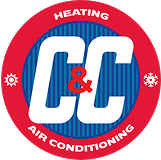An air conditioning system that regularly trips the circuit breaker can be a serious issue. The breaker will trip whenever either the outdoor AC compressor unit or the blower inside the building draws more amps than what the circuit is rated for, and this can happen for a number of different reasons.
If your AC does ever trip the breaker, you should first turn your thermostat to “Off” and then try to reset the breaker. If the AC then runs normally when you turn it back on and the circuit breaker doesn’t trip again, you typically have nothing to worry about. In this case, the problem is likely related to a power surge that caused the breaker to trip.
However, if the breaker trips again as soon you turn the AC back on, you shouldn’t keep trying to reset it. Continuing to try to run an air conditioning system that keeps tripping the breaker can be dangerous as it could potentially lead to a fire or cause serious damage to the AC unit or blower. In most cases, you will need to have a technician inspect the system to determine what is causing the breaker to trip and handle the repair. Here are some reasons your AC could be tripping the circuit breaker.
Clogged Air Filter
One of the more common reasons that an AC will trip the circuit breaker is due to an overly dirty, clogged air filter. For this reason, it’s always a good idea to check the condition of the air filter before resetting the circuit breaker. If the filter looks dirty or is covered in a thick layer of debris, you’ll want to replace it immediately before trying to turn your AC back on.
Very little air can flow through a filter when it’s clogged, and this leads to the blower struggling to draw air into the system. As a result, the blower will have to work much harder and may start drawing more power and thus overloading the circuit and causing the breaker to trip.
Dirty Condenser Coil
The condenser coil in the outdoor AC unit should always be professionally cleaned at least once a year as it can quickly become covered in a thick layer of dirt and dust. The condenser coil works in conjunction with the coil fan in the unit to release all of the heat that the system removed from the home. Any dust and dirt on the coil will insulate it and prevent the coil from properly releasing all of this heat into the surrounding air. This forces the compressor to work harder, which leads to it drawing more power and the breaker tripping.
The solution to this issue is to have a technician fully clean the condenser coil. Cleaning the coil is definitely not something you should ever attempt on your own as you don’t have the right tools or chemicals for the job, and you could also easily cause major damage to other parts since the fan assembly will need to be removed to access the coil.
Malfunctioning Coil Fan
The same overheating issue can also occur because the coil fan isn’t working properly for one reason or another. It could be that there is a stick or some other debris that is jamming the fan and preventing it from spinning. The fan motor could also have started to wear out, which can lead to the fan not spinning quickly enough to properly disperse the heat from the condenser coil. The same issue can also happen because the bearings that drive the motor are worn out and need to be replaced. The good news is that replacing the bearings or fan motor is a fairly simple task that can usually be done in just an hour or two.
Faulty Capacitor
AC units have both a start capacitor and a run capacitor, which provide the extra power needed both for the unit to start and to keep it running for longer periods of time. These capacitors are similar to rechargeable batteries as they store current whenever the unit is running. A huge amount of electricity is required for the compressor motor and coil fan motor to start, and the start capacitor releases its stored charge to help these motors turn on. Once the unit is running, the run capacitor then takes over and continues to supply additional current to keep the motors moving.
If either the start capacitor or run capacitor fails, the motors will start drawing much more current and lead to the circuit breaker tripping. A failed start capacitor won’t always trip the circuit breaker, but it will prevent the unit from ever turning on. If the start capacitor is bad, you will usually hear a repeated clicking noise coming from the unit when it attempts to start. You may also hear a humming sound, which results from the motors attempting to power on without the additional energy surge supplied by the start capacitor. Luckily, replacing a bad capacitor is one of the easiest and least expensive of all AC repairs.
Loose Electrical Connection or Damaged Wiring
Loose electrical connections or damaged wiring can cause a short that sends a huge amount of current surging through the circuit and trips the breaker. Damaged wiring typically results either from aging and normal wear and tear or due to overheating that leads to the wire insulation melting. These issues are quite easy to prevent simply by having your AC system professionally inspected and maintained every year.
Failing Compressor
As AC compressor units age, their performance tends to slowly decrease. This decreased performance can lead to the unit struggling and having to work harder, which can result in it occasionally drawing too much current and tripping the circuit breaker. This most commonly happens during extremely hot weather or any time the unit has to run for much longer at a time. If your AC is more than 12 to 15 years old and regularly trips the circuit breaker, it’s definitely time to start thinking about a replacement.
Grounded Compressor
This last issue is by far the worst and will usually require you to replace the entire AC unit. A grounded compressor is when one of the windings in the compressor motor break and comes into contact with the side of the unit. This leads to a short to ground, which is when the current flows out of the broken winding into the rest of the unit. When this happens, it usually leads to the oil in the compressor motor’s crankcase catching on fire and burning off. As a result, the motor will no longer be properly lubricated and will quickly seize up. This issue also contaminates the refrigerant, which means that all lines will need to be drained and cleaned.
A compressor motor cannot be serviced or repaired, which means the only option is to replace the motor. Unless your unit is still under warranty, you are almost always best to install a new unit rather than replace the motor as the total cost will be about the same for both.
If you’re dealing with an AC that keeps tripping the circuit breaker, you can count on the team at C & C Heating and Air Conditioning for help. We repair and service all AC makes and models, and our technicians have experience fixing all kinds of AC issues. We are proud to offer professional heating and cooling installations, repairs, and maintenance services, and we can help with your indoor air quality, too. We serve Roseville and the Detroit Metro area. Give us a call today to schedule an appointment.





